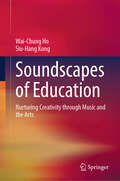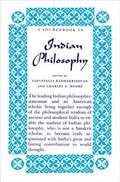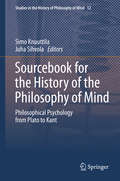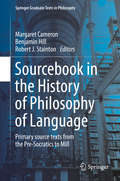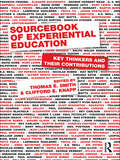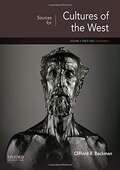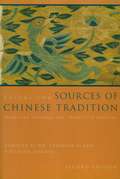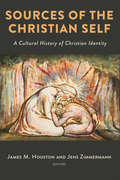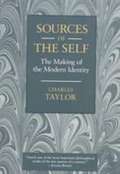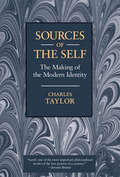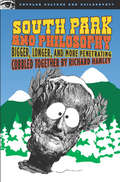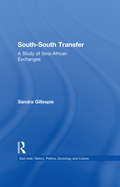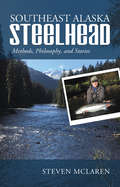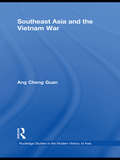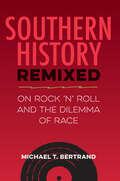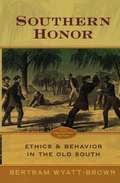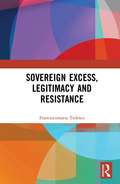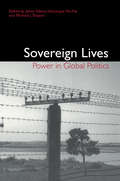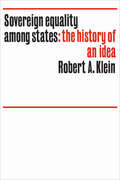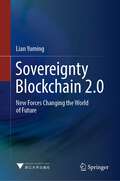- Table View
- List View
Soundscapes of Education: Nurturing Creativity through Music and the Arts
by Wai-Chung Ho Siu-Hang KongThis book focuses on nurturing students&’ creativity through the integration of music and other creative art forms. It presents the soundscape as an immersive auditory environment that surrounds us, capable of evoking emotions, stimulating imagination, and inspiring creative thought. By actively engaging with the soundscape while listening to music or the sound environment, individuals can enhance their creative experiences and discover new avenues for exploration and expression in teaching. Additionally, the book explores creativity within the soundscapes of diverse cultures, broadening students&’ perspectives, while promoting cultural awareness, empathy, and interconnectedness. The book pays particular attention to the Chinese community while considering its relevance in both Western and non-Western contexts. It emphasizes the influential role of teachers and the social environment in motivating creativity and creative behaviour, risk-taking, and innovative problem-solving skills. The book also showcases a comprehensive programme with resources for facilitating creative music-making, providing detailed insights into how creativity can be effectively sustained, stimulated, and promoted within the education system.
Sour Grapes
by Jon ElsterDrawing on philosophy, political and social theory, decision-theory, economics, psychology, history and literature, Jon Elster's classic book Sour Grapes continues and complements the arguments of his acclaimed earlier book, Ulysses and the Sirens. Elster begins with an analysis of the notation of rationality, before tackling the notions of irrational behavior, desires and belief with highly sophisticated arguments that subvert the orthodox theories of rational choice. Presented in a fresh series livery and with a specially commissioned preface written by Richard Holton, illuminating its continuing importance to philosophical enquiry, Sour Grapes has been revived for a new generation of readers.
Sourcebook In Indian Philosophy
by Sarvepalli Radhakrishnan Charles A. Moore<P>GENERALLY speaking, Western students of Indian philosophy are limited to secondary sources and to a few primary sources, such as translations of the Rg Veda, the more important Upanisads, and the Bhagavad-gītā.
Sourcebook for the History of the Philosophy of Mind
by Juha Sihvola Simo KnuuttilaFresh translations of key texts, exhaustive coverage from Plato to Kant, and detailed commentary by expert scholars of philosophy add up to make this sourcebook the first and most comprehensive account of the history of the philosophy of mind. Published at a time when the philosophy of mind and philosophical psychology are high-profile domains in current research, the volume will inform our understanding of philosophical questions by shedding light on the origins of core conceptual assumptions often arrived at before the instauration of psychology as a recognized subject in its own right. The chapters closely follow historical developments in our understanding of the mind, with sections dedicated to ancient, medieval Latin and Arabic, and early modern periods of development. The volume's structural clarity enables readers to trace the entire progression of philosophical understanding on specific topics related to the mind, such as the nature of perception. Doing so reveals the fascinating contrasts between current and historical approaches. In addition to its all-inclusive source material, the volume provides subtle expert commentary that includes critical introductions to each thematic section as well as detailed engagement with the central texts. A voluminous bibliography includes hundreds of primary and secondary sources. The sheer scale of this new publication sheds light on the progression, and discontinuities, in our study of the philosophy of mind, and represents a major new sourcebook in a field of extreme importance to our understanding of humanity as a whole.
Sourcebook for the History of the Philosophy of Mind: Philosophical Psychology from Plato to Kant (Studies in the History of Philosophy of Mind #12)
by Juha Sihvola Simo KnuuttilaFresh translations of key texts, exhaustive coverage from Plato to Kant, and detailed commentary by expert scholars of philosophy add up to make this sourcebook the first and most comprehensive account of the history of the philosophy of mind. Published at a time when the philosophy of mind and philosophical psychology are high-profile domains in current research, the volume will inform our understanding of philosophical questions by shedding light on the origins of core conceptual assumptions often arrived at before the instauration of psychology as a recognized subject in its own right. The chapters closely follow historical developments in our understanding of the mind, with sections dedicated to ancient, medieval Latin and Arabic, and early modern periods of development. The volume’s structural clarity enables readers to trace the entire progression of philosophical understanding on specific topics related to the mind, such as the nature of perception. Doing so reveals the fascinating contrasts between current and historical approaches. In addition to its all-inclusive source material, the volume provides subtle expert commentary that includes critical introductions to each thematic section as well as detailed engagement with the central texts. A voluminous bibliography includes hundreds of primary and secondary sources. The sheer scale of this new publication sheds light on the progression, and discontinuities, in our study of the philosophy of mind, and represents a major new sourcebook in a field of extreme importance to our understanding of humanity as a whole.
Sourcebook in the History of Philosophy of Language
by Robert J. Stainton Benjamin Hill Margaret CameronFor the first time in English, this anthology offers a comprehensive selection of primary sources in the history of philosophy of language. Beginning with a detailed introduction contextualizing the subject, the editors draw out recurring themes, including the origin of language, the role of nature and convention in fixing form and meaning, language acquisition, ideal languages, varieties of meanings, language as a tool, and the nexus of language and thought, linking them to representative texts. The handbook moves on to offer seminal contributions from philosophers ranging from the pre-Socratics up to John Stuart Mill, preceding each major historical section with its own introductory assessment. With all of the most relevant primary texts on the philosophy of language included, covering well over two millennia, this judicious, and generous, selection of source material will be an indispensable research tool for historians of philosophy, as well as for philosophers of language, in the twenty-first century. A vital tool for researchers and contemporary philosophers, it will be a touchstone for much further research, with coverage of a long and varied tradition that will benefit today's scholars and enhance their awareness of earlier contributions to the field.
Sourcebook of Experiential Education: Key Thinkers and Their Contributions
by Thomas E. SmithExperiential education is a philosophy and methodology for building knowledge, developing skills, and clarifying values by engaging learners in direct experience and focused reflection. To understand experiential education, what should one be reading? This sourcebook introduces philosophers, educators, and other practitioners whose work is relevant to anyone seeking answers to this question. Following brief snapshots of John Dewey and Kurt Hahn, the book is organized in four sections: Philosophers and Educational Theorists Nature Educators and Outdoor Educators Psychologists and Sociologists School and Program Founders. Each chapter focuses on an individual whose philosophy and practice exemplify a biographical and historical model for reaching a deeper understanding of experiential education. An appendix includes short biographical sketches of forty-five additional people whose contributions to experiential education deserve a closer look. This volume provides a much-needed overview and foundations for the field – for students in courses addressing experiential education, challenge education, outdoor experiential education, recreation education, and related fields; for learning theorists and curriculum specialists; for experiential educators; and for educational philosophers.
Sources for Cultures of the West: Volume 2: Since 1350
by Clifford R. Backman Christine AxenDesigned to accompany Cultures of the West: Volume 1: To 1750, Third Edition (2019), and Cultures of the West: Volume 2: Since 1350, Third Edition (2019), by Clifford R. Backman, the third editions of Sources for Cultures of the West, Volume 1: To 1750 and Sources for Cultures of the West,Volume 2: Since 1350 feature approximately six written sources per chapter that highlight key themes in the study of Western civilization. Each of the 189 sources is accompanied by a headnote. Each volume begins with a special unit, "How to Read a Primary Source," that provides students withimportant advice on how to work with textual documents in studying the past. The third edition includes twenty-one new sources.
Sources in The Development of Mathematics
by Ranjan RoyThe discovery of infinite products by Wallis and infinite series by Newton marked the beginning of the modern mathematical era. It allowed Newton to solve the problem of finding areas under curves defined by algebraic equations, an achievement beyond the scope of the earlier methods of Torricelli, Fermat and Pascal. While Newton and his contemporaries, including Leibniz and the Bernoullis, concentrated on mathematical analysis and physics, Euler's prodigious accomplishments demonstrated that series and products could also address problems in algebra, combinatorics and number theory. In this book, Ranjan Roy describes many facets of the discovery and use of infinite series and products as worked out by their originators, including mathematicians from Asia, Europe and America. The text provides context and motivation for these discoveries, with many detailed proofs, offering a valuable perspective on modern mathematics. Mathematicians, mathematics students, physicists and engineers will all read this book with benefit and enjoyment.
Sources of Chinese Tradition: From 1600 Through the Twentieth Century (Introduction to Asian Civilizations #Volume 2)
by Richard Lufrano Wm. Theodore de BaryFor four decades Sources of Chinese Tradition has served to introduce Western readers to Chinese civilization as it has been seen through basic writings and historical documents of the Chinese themselves. Now in its second edition, revised and extended through Deng Xiaoping and Jiang Zemin–era China, this classic volume remains unrivaled for its wide selection of source readings on history, society, and thought in the world's largest nation. Award-winning China scholar Wm. Theodore de Bary—who edited the first edition in 1960—and his coeditor Richard Lufrano have revised and updated the second volume of Sources to reflect the interactions of ideas, institutions, and historical events from the seventeenth century up to the present day. <p><p> Beginning with Qing civilization and continuing to contemporary times, volume II brings together key source texts from more than three centuries of Chinese history, with opening essays by noted China authorities providing context for readers not familiar with the period in question. <p> Here are just a few of the topics covered in this second volume of Sources of Chinese Tradition: Early Sino-Western contacts in the seventeenth century; Four centuries of Chinese reflections on differences between Eastern and Western civilizations; Nineteenth- and twentieth-century reform movements, with treatises on women's rights, modern science, and literary reform; Controversies over the place of Confucianism in modern Chinese society; The nationalist revolution—including readings from Sun Yat-sen and Chiang Kai-shek; The communist revolution—with central writings by Mao Zedong; Works from contemporary China—featuring political essays from Deng Xiaoping and dissidents including Wei Jingsheng. <p> With more than two hundred selections in lucid, readable translation by today's most renowned experts on Chinese language and civilization, Sources of Chinese Tradition will continue to be recognized as the standard for source readings on Chinese civilization, an indispensable learning tool for scholars and students of Asian civilizations.
Sources of Knowledge
by Andrea KernHow can human beings, who are liable to error, possess knowledge, since the grounds on which we believe do not rule out that we are wrong? Andrea Kern argues that we can disarm this skeptical doubt by conceiving knowledge as an act of a rational capacity. In this book, she develops a metaphysics of the mind as existing through knowledge of itself.
Sources of the Christian Self: A Cultural History of Christian Identity
by James M. Houston, Jens ZimmermannUsing Charles Taylor&’s magisterial Sources of the Self: The Making of the Modern Identity as a springboard, this interdisciplinary book explores lived Christian identity through the ages. Beginning with such Old Testament figures as Abraham, Moses, and David and moving through the New Testament, the early church, the Middle Ages, and onward, the forty-two biographical chapters in Sources of the Christian Self illustrate how believers historically have defined their selfhood based on their relation to God/Jesus. Among the many historical subjects are Justin Martyr, Origen, Augustine, Aquinas, Julian of Norwich, Dante, John Calvin, Teresa of Ávila, John Bunyan, Jonathan Edwards, Christina Rossetti, Blaise Pascal, Søren Kierkegaard, C. S. Lewis, and Flannery O&’Connor—all of whom boldly lived out their Christian identities in their varied cultural contexts. In showing how Christian identity has evolved over time, Sources of the Christian Self offers deep insight into our own Christian selves today.CONTRIBUTORS: Markus Bockmuehl Keith Bodner Gerald P. Boersma Hans Boersma Robert H. Bork Paul C. Burns Julie Canlis Victor I. Ezigbo Craig M. Gay Yonghua Ge Christopher Hall Ross Hastings Bruce Hindmarsh James M. Houston Sharon Jebb Smith Robert A. Kitchen Marian Kamell Kovalishyn Pak-Wah Lai Jay Langdale Bo Karen Lee Jonathan Sing-cheung Li V. Phillips Long Howard Louthan Elizabeth Ludlow Eleanor McCullough Stephen Ney Ryan S. Olson Steve L. Porter Iain Provan Murray Rae Jonathan Reimer Ronald T. Rittgers Sven Soderlund Janet Martin Soskice Mikael Tellbe Colin Thompson Bruce K. Waltke Steven Watts Robyn Wrigley-Carr Jens Zimmermann
Sources of the Self: The Making of the Modern Identity
by Charles TaylorIn this extensive inquiry into the sources of modern selfhood, Charles Taylor demonstrates just how rich and precious those resources are. The modern turn to subjectivity, with its attendant rejection of an objective order of reason, has led--it seems to many--to mere subjectivism at the mildest and to sheer nihilism at the worst. Many critics believe that the modern order has no moral backbone and has proved corrosive to all that might foster human good. Taylor rejects this view. He argues that, properly understood, our modern notion of the self provides a framework that more than compensates for the abandonment of substantive notions of rationality. The major insight of Sources of the Self is that modern subjectivity, in all its epistemological, aesthetic, and political ramifications, has its roots in ideas of human good. Sources of the Self provides a decisive defense of the modern order and a sharp rebuff to its critics.
Sources of the Self: The Making of the Modern Identity
by Charles TaylorIn this extensive inquiry into the sources of modern selfhood, Charles Taylor demonstrates just how rich and precious those resources are. The modern turn to subjectivity, with its attendant rejection of an objective order of reason, has led—it seems to many—to mere subjectivism at the mildest and to sheer nihilism at the worst. Many critics believe that the modern order has no moral backbone and has proved corrosive to all that might foster human good. Taylor rejects this view. He argues that, properly understood, our modern notion of the self provides a framework that more than compensates for the abandonment of substantive notions of rationality. The major insight of Sources of the Self is that modern subjectivity, in all its epistemological, aesthetic, and political ramifications, has its roots in ideas of human good. After first arguing that contemporary philosophers have ignored how self and good connect, the author defines the modern identity by describing its genesis. His effort to uncover and map our moral sources leads to novel interpretations of most of the figures and movements in the modern tradition. Taylor shows that the modern turn inward is not disastrous but is in fact the result of our long efforts to define and reach the good. At the heart of this definition he finds what he calls the affirmation of ordinary life, a value which has decisively if not completely replaced an older conception of reason as connected to a hierarchy based on birth and wealth. In telling the story of a revolution whose proponents have been Augustine, Montaigne, Luther, and a host of others, Taylor’s goal is in part to make sure we do not lose sight of their goal and endanger all that has been achieved. Sources of the Self provides a decisive defense of the modern order and a sharp rebuff to its critics.
South Park and Philosophy
by Richard HanleyTrey Parker and Matt Stone's long-running Comedy Central hit cartoon South Park has been equally cheered and reviled for its edgy humor, poited satire of current events and celebrities, and all-around obnoxiousness. But is there more to Kyle, the lonely Jew, Timmy and the Crips, Cartman's bitchiness, Chef's inappropriate advice, and Kenny's continued violent deaths than meets the eye? This collection of essays affirms that possibility. Individual chapters take a sometimes witty, often provocative look at "Is South Park a Libertarian Manifesto?", "That's So Gay!", and "Why Is Cartman Such an Asshole?". The writers apply classical philosophical analysis to this two-dimensional dystopia, whether in Paul Draper's "Why Good Things Happen to Bad People - The Problem of Evil in South Park" or Randall Auxier's "Finding South Park on the Map: Officer Barbrady, Mayor McDaniel, and Chef in Plato's Republic." South Park and Philosophy presents new and thoughtful approaches to understanding this surprisingly meaningful show.
South-South Transfer: A Study of Sino-African Exchanges (East Asia)
by Sandra GillespieThis study directs attention towards a South-South dimension of knowledge transfer: specifically, China's educational exchange programs for Africa.
Southeast Alaska Steelhead: Methods, Philosophy, and Stories
by Mclaren SteveSoutheast Alaska Steelhead will help all shermen catch more steelhead from Southeast Alaska to everywhere else steelhead may be found. Furthermore, it will give you the information you need to be successful on a self-guided steelhead shing trip to Southeast Alaska. It will inspire you to challenge yourself to become a better sherman and to think more deeply about this sport you love. By reading Southeast Alaska Steelhead, you will become more excited to get out on the river, to experiment, to learn, and to perfect your shing methods. Southeast Alaska Steelhead will add tools, methods, philosophy, and secrets to your current repertoire of skills you already possess. Simply stated, after reading Southeast Alaska Steelhead, you will hook more steelhead. e stories in Southeast Alaska Steelhead also teach life lessons that will be enjoyed by any sherman or outdoor enthusiast. Southeast Alaska Steelhead is a must have book for any serious sherman's library.
Southeast Asia and the Vietnam War (Routledge Studies in the Modern History of Asia)
by Cheng Guan AngThis book describes and explains Indonesia, Malaysia and Singapore’s attitudes and policies regarding the Vietnam War. While it is generally known that all three countries supported the US war effort in Vietnam, it reveals the motivations behind the decisions of the decision makers, the twists and turns and the nuances in the attitudes of Jakarta, Kuala Lumpur and Singapore following the development of the war from the 1950s through to its end in 1975. Although the principal focus is the three supposedly non-aligned countries - Indonesia, Malaysia and Singapore, the perspectives of Thailand and the Philippines - the two Southeast Asian countries which were formally allied with the United States - are discussed at the appropriate junctures. It makes an original contribution to the gradually growing literature on the international history of the Vietnam War and furthers our knowledge of the diplomatic history of Indonesia, Malaysia and Singapore in the early independent years, 1945/1949, 1957 and 1965 respectively, which coincided with early years of the Cold War in Southeast Asia.
Southern History Remixed: On Rock ’n’ Roll and the Dilemma of Race (Southern Dissent)
by Michael T. BertrandHow popular music reveals deep histories of racial tensions in southern culture Southern History Remixed spotlights the key role of popular music in the shaping of the United States South from the late nineteenth century to the era of rock ‘n’ roll in the 1940s, ’50s, and ’60s. While musical activities are often sidelined in historical narratives of the region, Michael Bertrand shows that they can reveal much about social history and culture change as he connects the rise of rock ‘n’ roll to the civil rights movement for racial equality. In this book, Bertrand traces a long-term culture war in which white southerners struggled over the region’s cultural complexion with music serving as an engine that both sustained and challenged white supremacy. He shows how rock ‘n’ roll emerged as a working-class genre with biracial sources that stoked white racial anxieties and engaged the region’s color and culture lines. This book discusses the conflict over southern identity that played out in responses to jazz, barn dance radio, Pentecostal and gospel music, Black radio programming, and rhythm and blues, concluding with a close look at the popularity of Elvis Presley within a racially segregated society. Southern History Remixed suggests that both Black and white southerners have used music as a tool to resist or negotiate a rigid regional hierarchy. Urging readers and scholars to take the study of popular music seriously, Bertrand argues that what occurs in the music world affects and reflects what happens in politics and history. A volume in the series Southern Dissent, edited by Stanley Harrold and Randall M. Miller
Southern Honor: Ethics and Behavior in the Old South (Revised)
by Bertram Wyatt-BrownSouthern Honor revolutionized our understanding of the antebellum South, revealing how Southern men adopted an ancient honor code that shaped their society from top to bottom. Using legal documents, letters, diaries, and newspaper columns, Wyatt-Brown offers fascinating examples to illuminate the dynamics of Southern life throughout the antebellum period. He describes how Southern whites, living chiefly in small, rural, agrarian surroundings, in which everyone knew everyone else, established the local hierarchy of kinfolk and neighbors according to their individual and familial reputation. By claiming honor and dreading shame, they controlled their slaves, ruled their households, established the social rankings of themselves, kinfolk, and neighbors, and responded ferociously against perceived threats. The shamed and shameless sometimes suffered grievously for defying community norms. Wyatt-Brown further explains how a Southern elite refined the ethic. Learning, gentlemanly behavior, and deliberate rather than reckless resort to arms softened the cruder form, which the author calls "primal honor." In either case, honor required men to demonstrate their prowess and engage in fierce defense of individual, family, community, and regional reputation by duel, physical encounter, or war. Subordination of African-Americans was uppermost in this Southern ethic. Any threat, whether from the slaves themselves or from outside agitation, had to be met forcefully. Slavery was the root cause of the Civil War, but, according to Wyatt-Brown, honor pulled the trigger.
Sovereign Excess, Legitimacy and Resistance
by Francescomaria TedescoWhen talking about his film Salò, Pasolini claimed that nothing is more anarchic than power, because power does whatever it wants, and what power wants is totally arbitrary. And yet, upon examining the murderous capital of modern sovereignty, the fragility emerges of a power whose existence depends on its victims’ recognition. Like a prayer from God, the command implores to be loved, also by those whom it puts to death. Benefitting from this "political theurgy" as the book calls it (the idea that a power, like God, claiming to be full of glory, constantly needs to be glorified) is Barnardine, the Bohemian murderer in Shakespeare’s Measure for Measure, as he, called upon by power to the gallows, answers with a curse: ‘a pox o’ your throats’. He does not want to die, nor, indeed, will he. And so, he becomes sovereign. On a level with and against the State.
Sovereign Lives: Power in Global Politics
by Jenny Edkins Véronique Pin-Fat Michael J. ShapiroFor International Relations scholars, discussions of globalization inevitably turn to questions of sovereignty. How much control does a country have over its borders, people and economy? Where does that authority come from? Sovereign Lives explores these changes through reading of humanitarian intervention, human rights discourses, securitization, refugees, the fragmentation of identities and the practices of development.
Sovereign Virtue: The Theory And Practice Of Equality
by Ronald DworkinEquality is the endangered species of political ideals. Even left-of-center politicians reject equality as an ideal: government must combat poverty, they say, but need not strive that its citizens be equal in any dimension. In his new book Ronald Dworkin insists, to the contrary, that equality is the indispensable virtue of democratic sovereignty. A legitimate government must treat all its citizens as equals, that is, with equal respect and concern, and, since the economic distribution that any society achieves is mainly the consequence of its system of law and policy, that requirement imposes serious egalitarian constraints on that distribution. What distribution of a nation's wealth is demanded by equal concern for all? Dworkin draws upon two fundamental humanist principles--first, it is of equal objective importance that all human lives flourish, and second, each person is responsible for defining and achieving the flourishing of his or her own life--to ground his well-known thesis that true equality means equality in the value of the resources that each person commands, not in the success he or she achieves. Equality, freedom, and individual responsibility are therefore not in conflict, but flow from and into one another as facets of the same humanist conception of life and politics. Since no abstract political theory can be understood except in the context of actual and complex political issues, Dworkin develops his thesis by applying it to heated contemporary controversies about the distribution of health care, unemployment benefits, campaign finance reform, affirmative action, assisted suicide, and genetic engineering.
Sovereign equality among states: The history of an idea
by Robert KleinUncritical adherence to the concept of sovereign equality is a major stumbling block to the reorganization of the world community. This study is the first place to trace the origins of the wording of the concept as it appears in the UN charter, as well as its historical antecedents and philosophical foundations. Two contradictory ways of viewing sovereign states and maintaining order among them are discussed. According to one, states are abstract entities with a fictitious personality; according to this view, international affairs must be based on the concept of great-power primacy. The opposite view, brought to world attention at the Hague Peace Conference of 1907, endows states with human personalities and transfers to them the political principle of individual equality. The book develops the tension between the real world of international politics and the abstract world where opposing concepts abide.
Sovereignty Blockchain 2.0: New Forces Changing the World of Future
by Lian YumingThis book is a continuation and deepening of Sovereign Blockchain 1.0. It mainly includes three views: 1) Blockchain is a super public product based on digital civilization. 2) The Internet is an advanced level of industrial civilization, the core of which is connection; blockchain is an important symbol of digital civilization, the essence of which is reconstruction. 3) Digital currency will trigger a comprehensive change in the economic field, and digital identity will reconstruct the governance model in the social field, thereby changing the order of civilization.This book is not only a popular science book based on blockchain thinking, theory and application research, but also a scholarly work on the technical and philosophical issues of governance and the future. By reading Sovereign Blockchain 2.0, policymakers can quickly understand the basic knowledge and frontier dynamics of science and technology; science and technology workers can grasp the general trend, seize opportunities, face problems and difficulties, aim at the world's science and technology frontier and lead the direction of science and technology development; experts and scholars in law and legal fields can see new ideas, concepts and models of data governance; social science researchers can discover data sociology and data philosophy issues.
